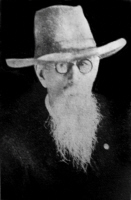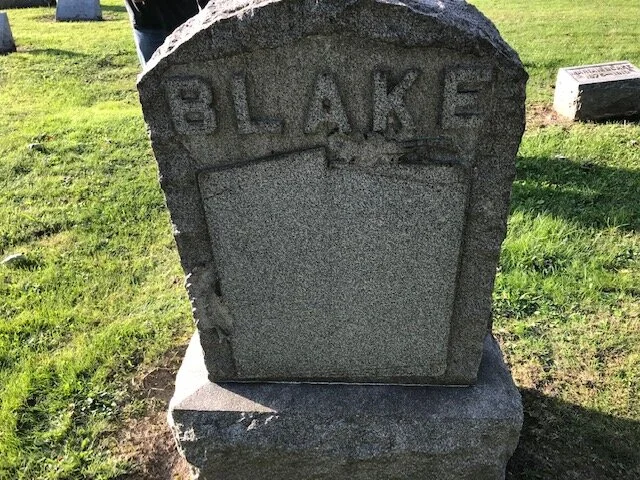JOHN W. BLAKE
JOHN W. BLAKE IS CALLED BY DEATH
Well Known Veteran of Civil War and Retired Pennsylvania Railroad Blacksmith Answers Summons.
ENTERED UNION ARMY WHEN HE WAS ONLY 15
Was One of Few Who Shook Hands With Lincoln - Delivered Address at Reception to U. S. Grant In 1868.
John W. Blake, veteran of the Civil war and retired Pennsylvania railroad blacksmith, died this morning at 3:30 o'clock at his home in Martinsburg, where he had spent the last few years of his life in retirement, after a long and eventful career. Death came peacefully to the aged veteran and was attributed to the infirmities of age. He was a member of the Grand Army of the Republic and was the last Civil war veteran of his home community. Mr. Blake was born in Martinsburg on May 8, 1848, a son of James and Margaret Ellen Blake. The early period of his life was spent in that community. learning the trade of blacksmith in his father's shop. He followed the trade throughout his active life, except for a few years in which he was engaged in teaching school.
Enlisted When Only 15.
When the Civil war broke out, Mr. Blake was eager to enlist but because of his youth he was unable to do so until 1864, by which time he had attained the age of 16. However, he had not yet attained that age when he enlisted. He went into the service in February, first going into the 152nd Pennsylvania infantry but he was immediately transferred to the 3rd heavy artillery, battery F, commanded by Captain John A. Blake. Going in as a private, he received successive promotions despite his youth and before the close of the war he had attained the rank of second lieutenant. His father was a soldier and great was the surprise of the father on one occasion in Virginia when he encountered his son, concerning whose enlistment he had not been apprised.
Talked With Lincoln.
He was stationed for some time at Fort Monroe and he took part in the siege of Fort Fisher and the battle of City Point. He was one of the officers on guard on the occasion of the historic conference between President Lincoln and Alexander H. Stephens, vice president of the confederacy, at Fort Monroe, when an unsuccessful effort was made to terminate the war. It was his privilege on that occasion to converse with the great war president, and to shake hands with him. Before the close of the war he was assigned to duty on the Freedmans bureau at Williamsburg, Va., and he remained in the service until Nov. 9, 1865, seven months after the actual close of the war.
Valedictorian of Class.
Upon his return home he pursued a course of study at the Juniata Collegiate institute at Martinsburg, at that time quite a noted institution of learning, and was graduated with the highest honors in 1871. At that early period of his life he gave evidence of the oratorical powers that later distinguished him and his address as valedictorian of his class was quite a notable effort that attracted much attention. There were seven in the graduating class. One of them, John H. Stephens, served three terms as superintendent of the Blair county schools; another, Calvin Thatcher, became a supreme court justice in Colorado; Albert B. Martin rose to distinction as a lawyer in Maryland; S. B. Lysinger was long a prominent member of the Blair county bar and others, Mr. Fleck and Miss Puderbaugh, achieved prominence. Following his graduation he taught school for several years and it is interesting to note he lacked but one vote of being principal of the Altoona High school and superintendent of the schools in the city at the time D. S. Keith was first chosen. He afterwards turned to his trade and in 1880 he located in Roaring Spring where he conducted a general blacksmithing and wagon making business, remaining there until 1891, when he moved to Altoona.
Entered Railroad Service.
He entered the service of the Pennsylvania railroad on Dec. 26, 1891, in the Juniata shops, then in their infancy, and he remained there until he retired on June 1, 1918, he having attained the age of 70 during the previous month. He was a skilled mechanic and always a hard and conscientious worker, highly esteemed by those in charge of the department where he worked and by his fellow workers. Following his retirement he returned to the home of his youth, having a tract of land near Martinsburg, and he devoted his declining years to its cultivation.
Active In Politics.
Throughout his life Mr. Blake was an active part in political affairs and he often sought office. It was his desire to go to the legislature and to congress, not to satisfy personal ambition, but because he felt that he could be of service to the workingmen in the halls of legislation. He was a Republican in politics, but decidedly independent. He was an inveterate enemy of the party bosses; he was firm in his convictions of what was the right thing to do and he could not be swerved from what he regarded as the path of duty by the blandishments of the bosses. In 1919 Mr. Blake was successful in winning the Republican nomination for mayor of Altoona. His Democratic opponent was Daniel S. Brumbaugh, while Charles E. Rhodes, who was then mayor, he having been elected four years before on a non-partisan ticket, was again put forth as a candidate by the labor party and was elected. In his prime Mr. Blake was much in demand as a campaign orator. He especially distinguished himself in the west in the historic campaign of 1896 in which McKinley and Bryan were the opposing candidates. The Democratic party was then i power and Mr. Blake was advertised as the "blacksmith out of a job."
Accepted Challenge.
On one occasion in Iowa, his claim of being a blacksmith was challenged by some of those in the audience. Accepting the challenge, Mr. Blake, accompanied by many of those in the audience, went to a blacksmith shop where he proceeded to forge a horseshoe and then he shod a horse that had been brought to the shop for that purpose. He most effectively silenced those who had pestered him at the meeting. After the election he sought appointment to the office of pension commissioner but it went to another. Mr. Blake always attended the national conventions and he became well known throughout the country by reason thereof. In 1912 he became a supporter of Theodore Roosevelt when the latter, deprived, as he believed, unfairly of the Republican nomination, established the Progressive or Bull Moose party. During that time Mr. Blake was invariably a candidate for congress of the legislature and on several occasions he lost by very narrow margins. Long identified with the work of the Grand Army of the Republic, Mr. Blake was frequent in demand as an orator on Memorial day and other patriotic occasions. In peace as well as in war he strove to serve his country faithfully, by example as well as by precept. When he spoke publicly, he always had a message to convey and he could express himself plainly and forcibly. Following his retirement he usually spent his winters in California where one of his sons resides and on these occasions he usually sent communications to the Altoona Mirror containing his observations of things seen and heard.
Was Temperance Advocate.
He despised the use of money in politics. He once said that he ran five times for congress and in all of those campaigns combined he expended $340. For many years he was prominently identified with the causes of temperance and prohibition. In his boyhood he was inducted into a temperance organization known as the Washingtonians and was sent by this group to a convention in Williamsburg where he made his first declaration in advocacy of the cause. Steadfastly throughout his career he stood four square for temperance, righteousness, justice, law and order, refusing to yield one iota when yielding might have resulted in his elevation to public office. He was married to Nancy Jane Longenecker in June, 1874. She passed away in 1926. He is survived by two sons and a daughter, Eugene L. Blake of Los Angeles, a deputy in the California supreme court; Frank H. Blake of this city, a railroad inspector, and Mrs. Ethel Kyler, also of this city, eight grandchildren and five great-grandchildren. He is also survived by two brothers, Rev. W. P. Blake of Hyattsville, Md., and U. S. Blake of Frederick, Kans., and two sisters, Mrs. Mary Ridenour, with whom he resided in Martinsburg, and Mrs. Alice Wogan of Altoona. He was a member of the Methodist church at Martinsburg. The body will be brought to the Lafferty funeral home in this city this afternoon, where it may be viewed on Friday. Funeral services will be conducted there Saturday afternoon at 2:30 o'clock and interment will be made in the Rose Hill cemetery.



